A Brief Rant from The Owl in the Rafters
 After a bit of an impromptu break, The Owl in the Rafters is back with a convention related update! Anime Central, one of the largest anime conventions in the U.S.’s midwest region was this past end of April weekend so I’d like to go over some brief highlights and address my usual concerns with the state of the convention scene and, to some extent, anime fandom in general. Let me start with a disclaimer, pointing out that my personal views expressed in this article and/or any of my articles for that matter are in no way reflective of the views of 91.8TheFan as a whole.
After a bit of an impromptu break, The Owl in the Rafters is back with a convention related update! Anime Central, one of the largest anime conventions in the U.S.’s midwest region was this past end of April weekend so I’d like to go over some brief highlights and address my usual concerns with the state of the convention scene and, to some extent, anime fandom in general. Let me start with a disclaimer, pointing out that my personal views expressed in this article and/or any of my articles for that matter are in no way reflective of the views of 91.8TheFan as a whole.
I’ll get this out of the way before my ranting muddles the fact, but I did in fact enjoy myself at ACen this year, as I tend to. In spite of anything I may say in what is to come, it really isn’t as if I have anything against anime conventions as a concept, or even as an over all experience. I go to anime conventions for pretty straight forward purposes and I almost always manage to get what I came for, my problem tends to stem more from the attitudes and behavior of other convention attendees. But before this devolves into bashing anime fans (which is not at all what I want this to come across as) I’ll just say that my basic issue with anime conventions is their growing lack of functionality.
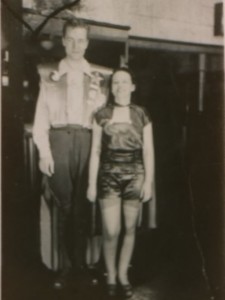 Once upon a time, anime conventions were a means for fans to broaden their scope and reach in anime and manga as a hobby. Most often college anime clubs would host small local conventions as a place to exchange personal findings in an age without the far reaching expanse of the internet that many fans take for granted today. The screenings, the fan panels, and the guests (when there were any) were all geared towards getting attendees interested in new anime and manga. In regards to basic theories of communication, presentation, and marketing, this boils down to three major objectives under which any sort of panel ought to fall under at least one, if not all of: Information/Awareness, Education, and Persuasion.
Once upon a time, anime conventions were a means for fans to broaden their scope and reach in anime and manga as a hobby. Most often college anime clubs would host small local conventions as a place to exchange personal findings in an age without the far reaching expanse of the internet that many fans take for granted today. The screenings, the fan panels, and the guests (when there were any) were all geared towards getting attendees interested in new anime and manga. In regards to basic theories of communication, presentation, and marketing, this boils down to three major objectives under which any sort of panel ought to fall under at least one, if not all of: Information/Awareness, Education, and Persuasion.
To inform an audience is really pretty straight forward: it means to make your audience aware of the thing you are talking about. Putting it into context, an informative con panel would seek to reach out to an audience unfamiliar with its subject, and let them know that it is a thing that exists and that at their own discretion they may or may not choose to be interested in. The point being that there will be people out there interested in your show, but only once they know it exists. (I say this specifically because if they need to be convinced to be interested in the show, that falls under Persuasion, which I’ll cover in just a bit.)
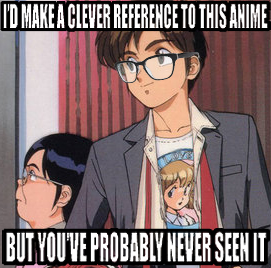 You may realize that this is rarely a singular and solitary goal behind a panel, but an example of a very common and mostly informative convention panel would be things like Why Haven’t You Seen This Yet? or 15 Shows I Bet You’ve Never Seen panels. This year at ACen the My Favorite Anime That No One’s Heard Of and RPGs That -Don’t- Start with Final Fantasy panels were prime examples of this type of panel. There are of course other factors at work, but the biggest function in the panel is the rapid fire name dropping of shows that the audience may not be familiar with, letting them know of a dozen or more titles that they’ve never heard of. The My Favorite Anime That No One’s Heard Of in particular did a fantastic job in opening the whole thing up to recommendations from the audience, passing the mic around to let people talk about their favorite anime that they were sure no one would have heard of.
You may realize that this is rarely a singular and solitary goal behind a panel, but an example of a very common and mostly informative convention panel would be things like Why Haven’t You Seen This Yet? or 15 Shows I Bet You’ve Never Seen panels. This year at ACen the My Favorite Anime That No One’s Heard Of and RPGs That -Don’t- Start with Final Fantasy panels were prime examples of this type of panel. There are of course other factors at work, but the biggest function in the panel is the rapid fire name dropping of shows that the audience may not be familiar with, letting them know of a dozen or more titles that they’ve never heard of. The My Favorite Anime That No One’s Heard Of in particular did a fantastic job in opening the whole thing up to recommendations from the audience, passing the mic around to let people talk about their favorite anime that they were sure no one would have heard of.
An important and subtle nuance of these panels is their panel names. For example, if you were to make something like say a Characters That Make Naruto Awesome with the intention of showcasing your favorite side characters then you’ve already shot yourself in the foot by narrowing your prospective audience down to Naruto fans, who presumably already watch the show/read the manga and know most of the characters. Your informative Naruto panel is now rendered uninformative. This is what people refer to as “Preaching to the Choir:” a scenario in which the people you are trying to inform, educate, or persuade, already know and/or agree with everything you’re saying, making your job in the speaker-audience relationship pointless. When your goal is to inform people of new material, name dropping a specific show in the title is almost always a bad move. Almost.
A fine exception is the RPGs That -Don’t- Start with Final Fantasy which plays upon the Final Fantasy reputation to draw in FF fans who presumably haven’t play many other JRPGs, as well as people who actively dislike FF’s reputation overshadowing other good JRPGs looking to find alternative titles. Another similar approach would be using a key artist or other creative name in the title and going over a selection of their work, drawing people in for the well known title(s) and informing them of the obscure ones. (Gee, doesn’t that approach sound familiar? wink wink nudge nudge know what I mean say no more) The key factor in either approach being that you are trying to get a crowd to come and find out about things they’ve never heard of.
 I said “find out” there and not “learn” because learning falls under the objective of Education. The act of educating an audience on a subject is not nearly as boring or strictly academic as it might sound. Educating on a subject is the simple act of explaining what it is, what it does, how it works, and/or how it came to be. “Naruto is a show about ninjas” is an informative statement, but not an educational one. (also a highly misleading one depending on how much the person I’m talking to actually knows about ninjas) “Naruto is a show about a boy with a monster sealed inside of him, outcast by society, trying to learn to gain acceptance and make friends. Also he is a ninja. Sort of…” Is a more adequate educational statement on the show.
I said “find out” there and not “learn” because learning falls under the objective of Education. The act of educating an audience on a subject is not nearly as boring or strictly academic as it might sound. Educating on a subject is the simple act of explaining what it is, what it does, how it works, and/or how it came to be. “Naruto is a show about ninjas” is an informative statement, but not an educational one. (also a highly misleading one depending on how much the person I’m talking to actually knows about ninjas) “Naruto is a show about a boy with a monster sealed inside of him, outcast by society, trying to learn to gain acceptance and make friends. Also he is a ninja. Sort of…” Is a more adequate educational statement on the show.
Obviously a better educational presentation of the show would go into more detail, but more detail is not always better. More important that the sheer number of facts or amount of detail is how relevant you can make the detail to the people in your audience and their interests. The over arching goal in an educational panel ought to be to give insight and clarity on a subject, presumably the kind that the audience was not familiar with prior to your panel. This particular goal also applies very heavily in the case of a workshop panel, for obvious reasons: you are not just educating an audience on how something works, but on how to replicate the action themselves.
Some great examples of educational panels that I attended this year at ACen included the Making Anime Educational For Your Anime Club and Fight The Stigma: Stop Bullying In Anime Clubs panels, both hosted by the same Arizona high school teacher and her husband, as well as a Wait a minute, smart people care about this stuff too? panel hosted by an enthusiastic college anthropology student intent on convincing people that anime is chock full of academic relevance in various fields of study.
Okay, so I admit that my personal interests in educational panels are more academic than not and I would love to go over some decent educational panels with a more general appeal, but… I didn’t attend any this year, and I’m not about to cite examples as “good” if I didn’t see them myself. What I will go over is a prime example of an educational panel done wrong, that I can vouch for: the Introduction to Japanese Mahjong panel.
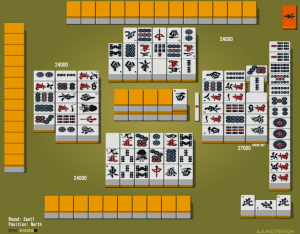 When attempting to educate on a subject the first and often biggest hurdle is to engage your audience; even assuming that they are attending out of a pre-established interest in your panel’s subject, you need to find a way to really keep them attentive as you work at the nitty gritty foundations of the subject. In the case of this mahjong panel, the presenter did nothing of the sort, and approached the entire panel with a single power point presentation. Interactivity is a huge component to learning, especially with a subject as complex as a game like Mahjong. While I didn’t really expect him to have half a dozen Mahjong sets on hand to set up walkthrough games with, even a simple demonstration of different phases of gameplay in motion would have been sufficient.
When attempting to educate on a subject the first and often biggest hurdle is to engage your audience; even assuming that they are attending out of a pre-established interest in your panel’s subject, you need to find a way to really keep them attentive as you work at the nitty gritty foundations of the subject. In the case of this mahjong panel, the presenter did nothing of the sort, and approached the entire panel with a single power point presentation. Interactivity is a huge component to learning, especially with a subject as complex as a game like Mahjong. While I didn’t really expect him to have half a dozen Mahjong sets on hand to set up walkthrough games with, even a simple demonstration of different phases of gameplay in motion would have been sufficient.
Still, resources can be limited and even without some form of live or hands on demonstration, an instructional panel on a game like Mahjong could still be done well. The second major fault I saw in this panel was that the entire presentation was essentially just reading off a standard rule book on Mahjong. It was not comprehensive and failed on many levels to really tie the different elements of game play together in a practical way. It covered individual rules and sometimes the events they followed, but made no real effort to show how it all related to the over all flow or experience of the game. For all the mechanical explanations, it really didn’t do anything that would help any of its audience members to actually get through a game of mahjong. If anything, what it did manage was to actively dissuade some of the audience from even giving the game a try.
 This brings me to the final communication objective: Persuasion. This is a trickier subject, and one that more often takes the backseat to one or both of the other two goals in a panel. As the name suggests, the point of a persuasive presentation would be to convince the audience of a particular idea or set of ideas. This naturally necessitates an Informative introduction to the idea being argued, as well as some Education on the nuances of the idea(s) before persuasion can even begin. The more powerful and prominent forms of persuasion are most obvious in things like debates where the end all goal is to convince a jury or audience to concede a certain point of view. In the case of anime convention panels, persuasion almost universally argues for the audience to read or watch a particular piece of work, which as you can imagine is generally just a passive effect achieved in the course of pursuing either of the first two goals.
This brings me to the final communication objective: Persuasion. This is a trickier subject, and one that more often takes the backseat to one or both of the other two goals in a panel. As the name suggests, the point of a persuasive presentation would be to convince the audience of a particular idea or set of ideas. This naturally necessitates an Informative introduction to the idea being argued, as well as some Education on the nuances of the idea(s) before persuasion can even begin. The more powerful and prominent forms of persuasion are most obvious in things like debates where the end all goal is to convince a jury or audience to concede a certain point of view. In the case of anime convention panels, persuasion almost universally argues for the audience to read or watch a particular piece of work, which as you can imagine is generally just a passive effect achieved in the course of pursuing either of the first two goals.
 When it comes to persuasion, the most logical way to go about things is to identify the key defining aspects of the show in mind, and then identify the values of your expected audience. If you’re expecting to get a crowd of 13-16 year old kids with minimal experience or range of interests in anime, you had better be ready with something matching the basic profile of shows they already like. So, if you expect your crowd to be mostly older males (who aren’t parents), and you try presenting a bunch of young children’s and young girls’ oriented series, then it might be safe to say that you’ve misaligned the values of your product and audience. It’s a square-peg-in-round-hole problem, really.
When it comes to persuasion, the most logical way to go about things is to identify the key defining aspects of the show in mind, and then identify the values of your expected audience. If you’re expecting to get a crowd of 13-16 year old kids with minimal experience or range of interests in anime, you had better be ready with something matching the basic profile of shows they already like. So, if you expect your crowd to be mostly older males (who aren’t parents), and you try presenting a bunch of young children’s and young girls’ oriented series, then it might be safe to say that you’ve misaligned the values of your product and audience. It’s a square-peg-in-round-hole problem, really.
This all may seem pretty obvious to you, especially if you have any sort of basic logical processing power, but if you could look at a convention panel schedule right now and check the listings, you might suddenly be surprised to find how totally pointless most convention fan panels really are. Even the ones that may have some basic value in content often fail to market themselves to a proper audience, and often execution is sloppy and lackluster. What we get are entire weekends of panelists preaching to the choir, patting each other on the back, and shameless circle jerks. (if you don’t know what that last one is, go and ask your parents) Rather than informing people of anything they weren’t familiar with, educating people on anything they didn’t already know, or persuading people of anything they didn’t already agree with, panels resort to cheap empty validation to foster a sense of belonging and a kind of crowd hype that makes people feel good about things they really have no right feeling particularly good about.
Imagine for a moment a basic dog training class; in this class the instructor allows for owners to feed their dog one treat for every time the dog successfully follows a command: this positively reinforces good behavior by having the dog associate something it likes and wants, with doing things that are good for it. Now imagine for a moment that one owner does not seem to grasp this concept and insists on feeding the dog a treat every single time the dog responds to the owner’s voice.  So the owner says “Inuyasha! Sit, boy!” and the dog lays down and rolls over onto its back. The owner feeds it anyway. The owner then says “Inuyasha, shake!” and the dog perks its ears up and stands up. The owner feeds it anyway. “Inuyasha, lay down!” The dog just sort of cocks its head to one side. The owner feeds it anyway. The dog now responds not to any good behavior, or any behaviors at all, but simply to its own name. Many anime fans similarly respond, not to any sort of intellectual or even mildly rational discussion or content in social interaction over anime, but simply to the familiar names of things they recognize. And like an excited puppy dog they get antsy and hyper and don’t sit still unless they’re being given constant unmerited validation for their lack of productivity. An exasperated metaphor, but I think it still makes my point. (I really do hope you can appreciate the irony in all this.)
So the owner says “Inuyasha! Sit, boy!” and the dog lays down and rolls over onto its back. The owner feeds it anyway. The owner then says “Inuyasha, shake!” and the dog perks its ears up and stands up. The owner feeds it anyway. “Inuyasha, lay down!” The dog just sort of cocks its head to one side. The owner feeds it anyway. The dog now responds not to any good behavior, or any behaviors at all, but simply to its own name. Many anime fans similarly respond, not to any sort of intellectual or even mildly rational discussion or content in social interaction over anime, but simply to the familiar names of things they recognize. And like an excited puppy dog they get antsy and hyper and don’t sit still unless they’re being given constant unmerited validation for their lack of productivity. An exasperated metaphor, but I think it still makes my point. (I really do hope you can appreciate the irony in all this.)
Of course there is a 4th approach, which is generally more effective than any of the three central ideas, but somewhat controversial on account of it hinging on the assumption that your audience is made up chiefly of idiots. This 4th backup objective is of course Comedy. If what you have to talk about isn’t interesting, if you aren’t interesting, and/or if you assume that your audience is just too dense to pay any attention for more than 3 minutes at a time, the easiest and shallowest way to keep attention is to crack jokes about as frequently as a valley girl says the word “like.” It doesn’t matter if you aren’t a comedian either, because geeks will laugh at just about anything: it doesn’t even have to be an actual joke. No set up or punch lines necessary. All you need to do is drop a few names, reference familiar titles or terminology in a sarcastic or sardonic tone and anime fans will start to giggle like 6 year olds at a poop joke. (I said it before but there is some irony in here if you can spot it. Hint: It’s everywhere.)
 As I said at the start of this, once upon a time there was no high speed internet and countless sloppily researched wikis over-saturating people’s think-spheres with an over-abundance of arbitrary factoids with pointlessly derivative citations. With the advent of the modern internet community as we know it, certain aspects of the humble old fashioned anime convention have become obsolete, but rather than develop any new means to really take advantage of the size and breadth of anime convention crowds, convention administrators have merely struggled to hang on to their patrons with every ounce of strength, rather than taking the time and effort to scale back their events to more manageable sizes and focus on innovating new ways to entertain and unique hooks to gain and maintain a new audience. But I digress…
As I said at the start of this, once upon a time there was no high speed internet and countless sloppily researched wikis over-saturating people’s think-spheres with an over-abundance of arbitrary factoids with pointlessly derivative citations. With the advent of the modern internet community as we know it, certain aspects of the humble old fashioned anime convention have become obsolete, but rather than develop any new means to really take advantage of the size and breadth of anime convention crowds, convention administrators have merely struggled to hang on to their patrons with every ounce of strength, rather than taking the time and effort to scale back their events to more manageable sizes and focus on innovating new ways to entertain and unique hooks to gain and maintain a new audience. But I digress…
I apologize again for my somewhat directionless and cynical rambling, and for giving ACen something of a backseat in this whole article, but what I really want to get at with all of this is that I implore you all to consider what it is you love about anime, manga, Japanese video games, Japanese live action drama, film, music, etc. and think back to all those times you’ve shown a friend something they’ve never seen or heard of before. Remember the excitement that lit up your friends’ face as they fell in love with whatever it was you showed them, and remember how you felt when you saw them enjoying themselves and knowing you were the cause. This is what anime conventions are supposed to be about, spreading your interests as an anime fan to other people and letting others share in your enjoyment of a show, manga, film, song/band, etc…
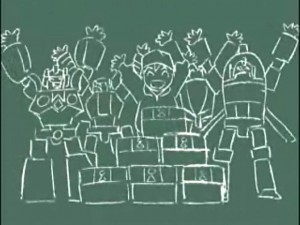 If you’ve ever felt what I just described and you are passionate about your hobbies and want to find that feeling again, I urge you to consider organizing a panel for the next convention you attend. If there is an aspect of anime and/or manga, or any other Japanese media, that you feel has an unappreciated or unknown level of fascinating detail to explore, share it! We’re geeks and nerds, our wealth of arbitrary information is our strongest defining feature, why not put it to some use?
If you’ve ever felt what I just described and you are passionate about your hobbies and want to find that feeling again, I urge you to consider organizing a panel for the next convention you attend. If there is an aspect of anime and/or manga, or any other Japanese media, that you feel has an unappreciated or unknown level of fascinating detail to explore, share it! We’re geeks and nerds, our wealth of arbitrary information is our strongest defining feature, why not put it to some use?
As a small notice: my updates this month will both have been pushed back, so my next update will be the 23rd and not the 16th.



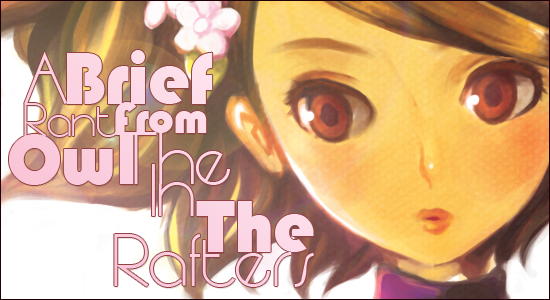












iStalk? uStalk!